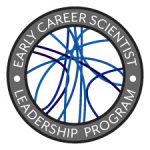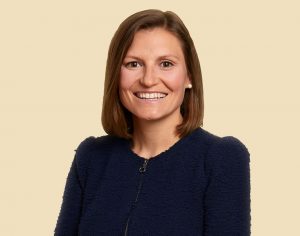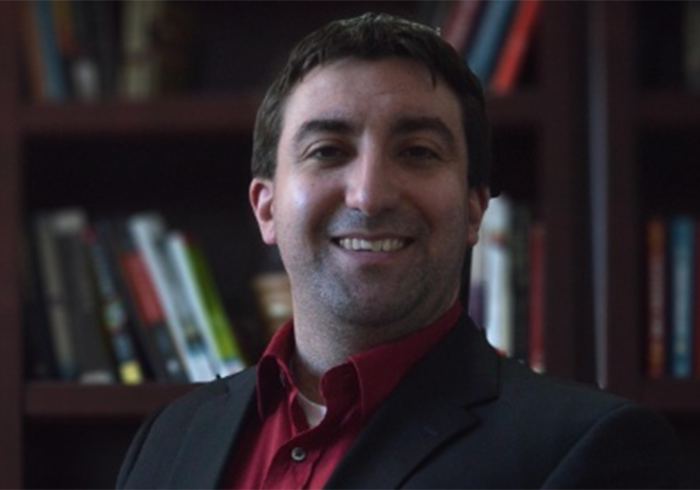 As a Principal at venture capital firm Canaan, Colleen Cuffaro works to identify biopharmaceutical companies that have the next big idea in drug development.
As a Principal at venture capital firm Canaan, Colleen Cuffaro works to identify biopharmaceutical companies that have the next big idea in drug development.
In the Decoding Life series, we talk to geneticists with diverse career paths, tracing the many directions possible after research training. This series is brought to you by the GSA Early Career Scientist Career Development Subcommittee.
Colleen Cuffaro has always had an interest in the drug development process. Before grad school, she planned to join a small biopharmaceutical company, but a serendipitous seminar put her on a course towards venture capital and early-stage investing. During her PhD, she found mentorship, built a network, and honed the skills that led to her current position as Principal at Canaan Partners, an early-stage healthcare venture capital firm. As a venture capitalist, she evaluates the market potential of new technology, invests in companies started by academics, and takes leadership roles in the new companies.
How did your life experiences lead you to your current career?
When I was 16 years old, I took chemistry, and I loved it. A friend’s dad was a chemist at a pharmaceutical company; he told me about his career, in which he got to invent new drugs. I thought that was the coolest application of chemistry, and it seemed like a really cool career path. Later, I was working as an analytical chemist after finishing undergrad when I started to learn about small biotech and pharma companies. I had known about the Mercks and Novartises and Pfizers of the world, but I hadn’t really had exposure to startup companies before.
I went to graduate school at Yale, and I never really considered an academic career. During my PhD, if you asked me where I hoped to be in 20 years, I’d have said “CEO of a biopharm startup.” That goal drove me to get involved in the Yale Healthcare and Life Sciences Club, of which I eventually became president. During this time, Tim Shannon, the general partner at Canaan, came and gave a talk at Yale. He was helping to translate technology from the university to the business world by starting companies with academics who were working on incredibly cool science. I was very inspired by his career and thought it sounded like the perfect job. I reached out to Tim for career advice, and when Canaan had an opening a year later, he reached out to me.
What is your role at Canaan?
 When I started at Canaan, I wanted to learn how to start companies, so I joined as an Analyst. At Canaan, the roles are Analyst, Associate, Principal, Partner, and General Partner. You can think of Analyst and Associate as support roles for the investors; they evaluate potential companies to invest in. The Analyst position is supposed to be an apprenticeship, where you stay with the firm for two or three years to learn the business before doing something else or joining one of the companies you worked with. Once you move to Associate, there is some expectation that you’re interested in becoming a Partner, where you would make investments and sit on company boards. Principal is the level at which you begin to make your own investments, and that’s where I am now. I’m still learning from the General Partners, but I have a lot more independence.
When I started at Canaan, I wanted to learn how to start companies, so I joined as an Analyst. At Canaan, the roles are Analyst, Associate, Principal, Partner, and General Partner. You can think of Analyst and Associate as support roles for the investors; they evaluate potential companies to invest in. The Analyst position is supposed to be an apprenticeship, where you stay with the firm for two or three years to learn the business before doing something else or joining one of the companies you worked with. Once you move to Associate, there is some expectation that you’re interested in becoming a Partner, where you would make investments and sit on company boards. Principal is the level at which you begin to make your own investments, and that’s where I am now. I’m still learning from the General Partners, but I have a lot more independence.
What does your typical workday look like?
One of the best parts of my job is that it doesn’t look the same every day. From afar, it might look like just a lot of emails, phone calls, and meetings, but the contents of those emails, phone calls, and meetings are quite diverse. One hour, I could be looking at western blots from a lab at UConn and trying to decide if it’s exciting science that’s worthy of investment, and the next hour, I could be on the phone with a lawyer talking about the nitty-gritty of the investment terms. Some days, I might be traveling to a university to meet with academics to learn about their science to see if there’s fodder for starting a new company. Other days, I might be at a board meeting.
What experiences did you have during your academic training that are particularly useful now?
A very important skill I gained during grad school was how to break down large problems and questions into manageable pieces. In this job, I spend a lot of time reading the literature and distilling large amounts of scientific research down into a conclusion that informs the decision to invest or not. I apply skills I learned in developing the aims in my thesis research to breaking down these investments into prioritized questions, and then I diligently tackle each of them. That’s something I think graduate students are very good at. You might go to a seminar on a topic that has absolutely nothing to do with your thesis, but you learn how to listen and gather enough information to be able to ask intelligent questions. That’s very similar to what we do every day as we sit and listen to pitches. I may not be familiar with the topic, but I can extract enough information to make decisions about whether or not I think it’s a good investment.
How do you manage your time to work efficiently?
It’s incredibly important to be efficient in this job. You need to know what to address first so that you don’t waste your time on things that don’t need immediate attention. Prioritization is critical; otherwise, you can feel like you’re drowning. I’ve also found that having defined time in my day where I’m not doing work or thinking about work is important for me. I do Ironman triathlons, and at the peak of my training, I’m training 20 hours a week. To be able to fit that into a busy work schedule, you need to have defined time where you’re truly focused on the specific task at hand. By training in the morning before I get into the office, I can put my head down and focus on work once I’m there.
Are there additional skills you wish you had picked up during graduate training?
I think it would have been helpful to have more exposure to both the science and the business aspects of turning a lab discovery into a viable drug. To address this gap, I proposed and helped start the Canaan-Yale Fellowship program, which provides medical and life science graduate students at Yale the opportunity to gain exposure to drug development. The students do small projects to help evaluate if an investment we’re considering is worth making. In exchange for the time they’re spending in helping us with those projects, we teach them about venture capitalism. We teach them all the things that I wish I had learned before I started at Canaan.
As a mentor, what do you look for in mentees?
It’s important for a student to show that they are hungry to learn. I think we see a lot of young people today who, for whatever reasons, feel the need to overstate their experience, but for me, it’s very important for someone to come to a role like the Canaan Fellowship and just be eager to learn. I want them to be open and to absorb everything they can from us. That’s the way I’ve always approached things: be humbled by the experience of my mentors and take it all in.
About the author:
 Tony Patelunas is a liaison on the Early Career Scientist Career Development Committee and a PhD Candidate in the department of Molecular and Cell Biology at the University of Connecticut. He strives to build a community of scientists that transcends industries and brings data-driven decision making to policy.
Tony Patelunas is a liaison on the Early Career Scientist Career Development Committee and a PhD Candidate in the department of Molecular and Cell Biology at the University of Connecticut. He strives to build a community of scientists that transcends industries and brings data-driven decision making to policy.
Learn more about the GSA’s Early Career Scientist Leadership Program.













